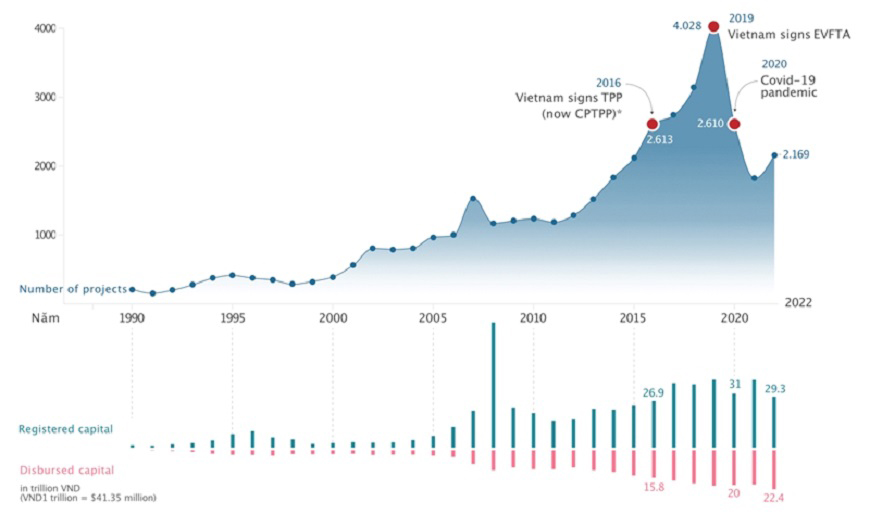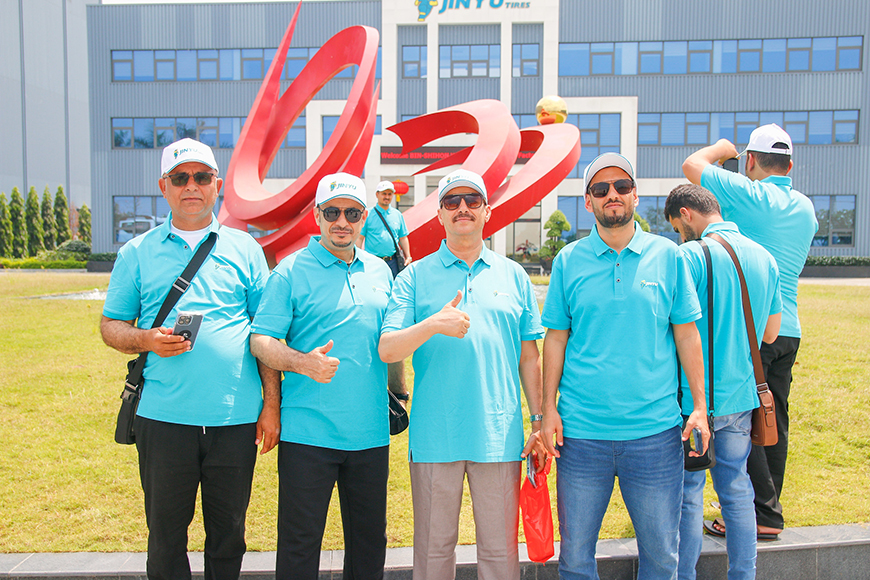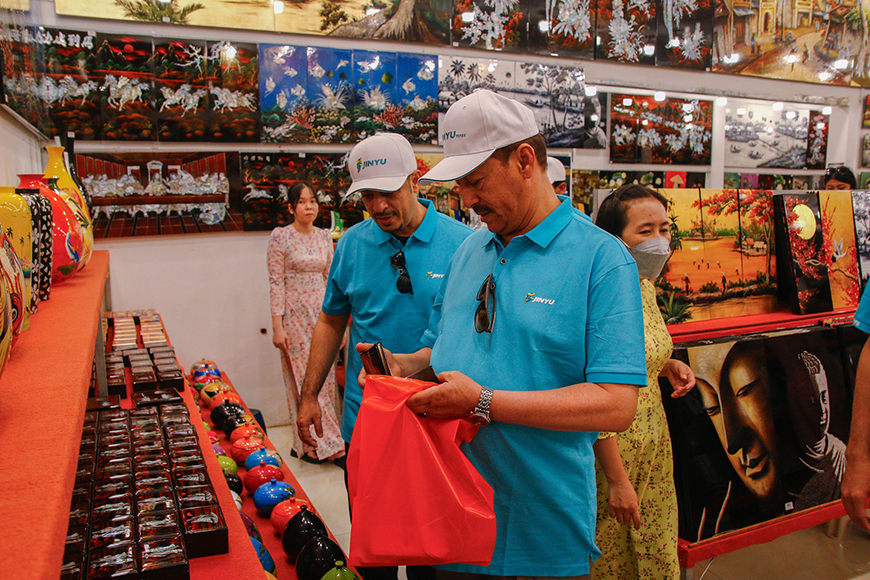Vietnam, land of foreign investment
Vietnam is increasingly attracting foreign investors, captivated by its rich past, dynamic present and promising future. With a thousand-year history and vibrant culture, the country has adapted to global economic changes and positioned itself as a must-see destination for international businesses.
Did you know that… In January, Vietnam recorded some $2.36 billion in foreign direct investment (FDI), 40% more than the same period in 2023, the Ministry of Planning and Investment announced. This optimistic figure makes us hope that Vietnam remains a preferred destination for foreign investors in 2024.
While remaining true to our DMC/MICE vision, this article explores the country’s strengths, promising sectors and future prospects for foreign investors.

The three major waves of foreign investment over the past 35 years. Photo: Vnexpress
An expanding industrial heritage
Vietnam’s industrial history is relatively young, but it has grown rapidly in recent decades.
After the Vietnam War in the 1970s, the economy was essentially agricultural. However, in the aftermath of the war, the country embarked on a phase of reconstruction and gradual opening to the market economy. The "Doi Moi" policy, initiated in 1986, marked a major turning point in encouraging foreign investment. This policy has enabled the emergence of a young and dynamic workforce, a valuable asset for manufacturing industries.
However.. It was far from a guaranteed success!
Flash back: Vietnam’s economy at the end of the war against the Americans
The trade embargo imposed by the United States on Vietnam in 1975 had a profound impact on the country’s economy. This measure sought to isolate Vietnam and impede its post-war reconstruction. The embargo resulted in:
- • Lower exports: Vietnam lost its main export markets for agricultural and manufactured goods, resulting in lower revenues for the country.
- • Shortage of consumer goods: Access to imported products was limited, resulting in a shortage of basic consumer goods and runaway inflation.
- • Impediment to development: The embargo restricted Vietnam’s access to foreign technology and capital, hampering the development of its economy.
Moreover, the US embargo has had disastrous socio-economic consequences for Vietnam:
- • Poverty: Living standards have fallen dramatically, with more than half the population living in poverty.
- • Hunger and malnutrition: Agricultural production was affected by the embargo, resulting in increased hunger and malnutrition.
- • Unemployment: Lack of investment and business closures have led to increased unemployment.
- • Infrastructure degradation: Lack of resources has led to deterioration of infrastructure such as roads, bridges and hospitals.
In response to the dire economic situation, the Vietnamese government implemented economic reforms in 1986. The "Doi Moi" - the renovation policy - opened the country to foreign investment and liberalized the economy. This initiative aimed to transform the country’s planned economy into a socialist market economy. Prior to Doi Moi, the Vietnamese economy was characterized by high centralization, inefficiency and low growth. The private sector was largely non-existent and agriculture dominated the economy. Doi Moi introduced several major changes, including:
- • Decentralization of economic power: provinces and businesses have gained greater autonomy in managing their affairs.
- • Opening up to the private sector: private enterprises have been allowed to establish themselves and operate in a wide range of sectors.
- • Attracting foreign investment: The government has implemented policies to attract foreign capital and modern technologies.
- • Integration into the global economy: Vietnam joined international organizations such as ASEAN and the WTO.
In 1994, Bill Clinton lifted the American embargo, allowing Vietnam to resume trade relations with the United States and access international markets.

Our valuable VIP Customers from Saudi Arabia. Photo: Trusted DMC
An attractive economic panorama
Today, Vietnam has become a preferred investment destination for foreign industries. The land of the dragon is positioned as an unavoidable choice for foreign investors, attracting as a magnet capital from Asia, Europe and America. These countries are all drawn to Vietnam’s many advantages and benefits:
- ✓ Stable and robust economic growth: Vietnam’s GDP has grown at an average annual rate of 6.5% over the past 20 years, making it one of the most dynamic economies in Asia. This growth is driven by domestic demand, exports and foreign investment.
- ✓ A young and dynamic workforce: The Vietnamese population is young and growing, with a median age of 32. The workforce is also skilled and productive, with a literacy rate of 95%. In addition, it is known for its discipline, dynamism and ability to adapt quickly to new technologies. Not to mention the relatively attractive labour cost compared to neighbouring countries.
- ✓ A favorable business environment: The Vietnamese government has put in place a number of measures to improve the business environment, such as simplifying administrative procedures and reducing taxes, measures framed by transparent laws and regulations. In addition, local authorities are committed to improving the business climate and reducing bureaucracy.
- ✓ Access to regional markets: Due to its strategic geographical location, Vietnam serves as a gateway to Southeast Asia. As a member of various free trade agreements such as ASEAN and the CPTPP, the country with two deltas offers easy access to a market of more than 600 million people. It should be noted that the Asian tiger also has direct access to the sea, which facilitates trade.
Did you know that… To date, 111 countries and territories have invested in Vietnam.
► DMC/MICE in Vietnam: exponential growth
A promising future for Vietnamese industry
While Vietnam still has a long way to go before catching up with developed countries, it offers many opportunities for foreign investors in key sectors such as manufacturing, infrastructure, energy, tourism and agriculture. The country of stilt houses is poised to become a major player in the global industry, with very positive prospects for the future, thanks to:
- ✓ Continued economic reforms: The Vietnamese government is committed to pursuing economic reforms and improving the business climate.
- ✓ Infrastructure development: The government invests heavily in infrastructure development, including roads, ports and airports.
- ✓ Growing Middle Class: The Vietnamese middle class is growing rapidly, creating new demand for quality products and services.
The future of foreign investment in Vietnam
Vietnam is at a turning point in its economic development. The country has reached an intermediate level of development and aspires to become a high-income country by 2045. To achieve this goal, Vietnam will need to attract more foreign investment.
The future prospects for foreign investment in Vietnam are promising. The Vietnamese government is committed to pursuing economic reforms and improving the business climate. The country has also implemented a series of policies aimed at attracting foreign investors, such as reducing taxes, improving infrastructure and developing the skills of the workforce.
There are several key sectors in Vietnam that offer promising investment opportunities:
- • Manufacture: Vietnam is already an important hub for the manufacturing industry, especially in the textile and electronics sectors. The country has the potential to attract more investment in sophisticated industries such as automotive and aerospace.
- • Infrastructure: Vietnam needs to develop its infrastructure to support economic growth. Foreign investors can help build roads, bridges, ports, airports and other critical infrastructure.
- • Energy: Vietnam has high energy demand. Foreign investors can contribute to the development of renewable energy sources such as solar and wind.
- • Tourism: Vietnam is an attractive tourist destination with a rich cultural and natural heritage. The country has the potential to attract more foreign tourists and develop its tourism sector.
- • Agriculture: Vietnam is an important agricultural country. Foreign investors can contribute to the modernization of Vietnamese agriculture and increase agricultural production.

Shopping after conference! Photo: Trusted DMC
Opportunities for DMC/MICE companies in Vietnam
Vietnam is a growing market for DMC/MICE companies (Destination Management Company/ Meetings, Incentives, Conferences, Exhibitions). Increased foreign investment in the country has led to an increase in conferences, trade events and incentive travel.
Recently, for example, Trusted DMC had the pleasure of hosting a VIP delegation from the Jinyu Tire factory in Vietnam. We took care of accommodation, logistics, halal meals and entertainment with professionalism and enthusiasm, offering a wide range of assistance services.
This event reinforces our belief that DMC/MICE companies based in Vietnam have many opportunities to benefit from the growth of foreign investment in the country. By adapting to the needs of international clients and investing in the quality of their services, they can become key players in the development of business tourism in Vietnam.
This is our mission!